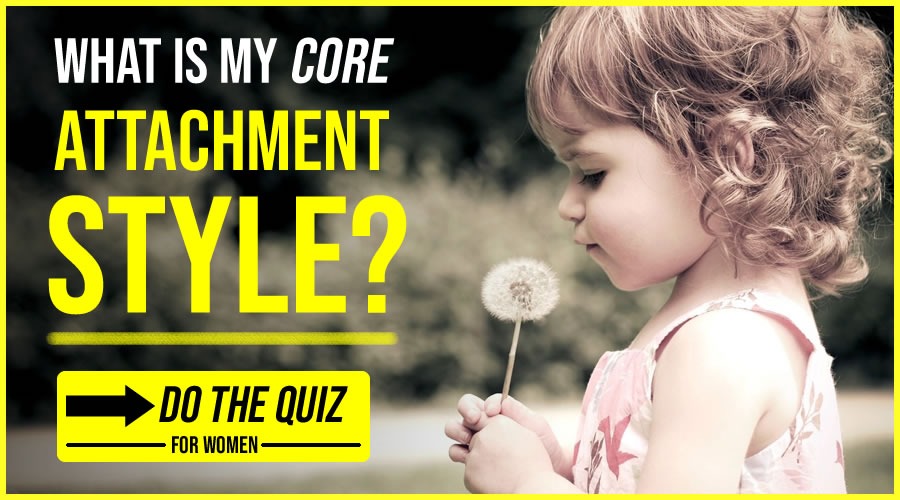NCRW
8 Signs An Avoidant Loves You + How To Inspire More Of It
Author: Sarah Meyer
When you have a partner who has an avoidant attachment style, or who displays generally avoidant behavior in relationships, it can be hard to feel secure in their love for you.
This is because the avoidant partner may gravitate towards solitude and self-sufficiency.
They also have difficulty with the flow of affection and support that usually exists in an intimate relationship.
As I have described in this article on avoidant attachment, adults with avoidant attachment patterns have typically learned in childhood that their needs are shameful and should be suppressed, or taken care of in private.
They likely experienced neglectful or emotionally unavailable parenting. As a result, they may not have had a chance to develop some of the skills they need to connect closely with others.
This can mean that they:
- Feel uncomfortable with commitment and obligation
- Avoid emotional discussions (that would require them to feel deeply themselves, beyond the point they feel able to cope with)
- Run hot and cold
- Frequently withdraw or disappear from the relationship
The difficult thing is that it is exactly these aspects of a relationship that help us feel sure of our investment in someone. Things like:
- Expressions of loyalty
- Consistency
- Deep emotional connection
- Powerful shared moments where you feel like your partner knows you better than anyone else in the world
Without these important ingredients, it can be hard to trust that our love has a chance to stand the test of time.
Unfortunately, it is very common for partners of avoidants to feel insecure, unfulfilled, or to have doubts as to where they stand.
It’s important to remember, though, that it is by no means impossible to have a happy and meaningful relationship with an avoidant partner.
If you’re in this situation, one of the most empowering things you can do is learn to decipher the ways in which your partner does show love; and learn to draw security from those signals.
An avoidant in love may be quieter, more idiosyncratic, and more indirect than a securely attached partner.
But there will still be signs that you hold a place in their life that no-one else could.
We’re going to look now at 8 common signs that an avoidant loves you - and how you can inspire more of that love from them.
Table of Contents
Sign #1: They Let You Get Closer To Them Than Anyone Else
When trying to work out where you stand with your avoidant partner, it’s important to compare the way your partner acts with you against their own individual baseline.
If you try to compare your relationship to your friends’ relationships or what you see on Netflix, it’s likely that your partner will come up short because of their difficulty with expressing emotion.
What makes much more sense is to look at the way they treat you as compared to the way they treat everyone else in their life.
Do you occupy a special place in their world?
Do they spend more time with you than they do with other people?
Do they tell you things about themselves that they wouldn’t tell anyone else?
If the answer is yes, it’s likely that they do love you.
Especially if - while remaining somewhat reserved in the relationship - they are not pursuing or keeping alternative partners around.
If you have a look at your partner’s life and note that:
- You are the closest person in their life
- There is no one else that they are going to get connection from or hope to get connection from; and
- They are significantly more open and present with you than they are with other friends and family
Then they are probably committed to you and these are some of the biggest signs an avoidant loves you.
Even if this doesn’t look as obvious or as flowery as it does for other people when they are in love.
And often, if you are able to help your partner feel safe with you by showing them consistent love, then they will become more comfortable expressing themselves over time.
I’ll talk about this later in the article, but it is part of the process of earning secure attachment through a healthy relationship in adulthood.
(Why is this important? It is because your core attachment style largely dictates and influences what happens in your relationship. Thus it’s imperative you understand your core attachment style!)
Sign #2: They Keep Coming Back To You
A person with avoidant attachment patterns may have a habit of disappearing when things get difficult.
They may withdraw during or following conflict in the relationship, and also when they face hardship in their own lives (or sometimes - when you face hardship).
This is because people with avoidant attachment patterns have come to believe, usually due to childhood neglect, that:
- They are better off handling their problems alone; and
- To fear (sometimes subconsciously) that their problems may be seen as a burden on others
It is also because avoidants struggle with emotional regulation, and prefer to use de-activating strategies such as denial and suppression when faced with negative emotion (Mikulincer & Shaver, 2007).
These habits can be extremely harmful and distressing for the partner of the avoidant, who frequently feels abandoned.
There are definitely things that you and your partner should do to help address these patterns and foster better coping strategies.
But in the meantime it may also be comforting to know that if your avoidant partner consistently comes back to you once they have calmed down, they probably really value your relationship.
It can be very frightening for an avoidant to experience conflict, and sometimes running away and shutting everything out can feel like the only option they have.
But if they:
- Return to you afterwards
- Make an effort to explain what happened; and
- Try to re-establish their routine with you
Then they probably love you and need your help to stay connected during difficult times.
Sign #3: They Share Hobbies, Activities, Or Interests With You
Avoidants can be notoriously private.
In public, they may stick to scripts or humor as a way of avoiding deep connection with others, and they will be reluctant to share the things about them that are unique.
They might work alongside other people every day, but have no-one in their lives that actually knows that they play guitar and sing in their spare time, or love anime, or read a lot about politics, or speak another language.
If you, on the other hand, have been invited into their world to share the things that are important to them, this is one of the really good signs an avoidant loves you.
Because of their discomfort around attachment, avoidants may prefer to connect through interests or shared experiences than through deep conversation or emotional exchanges.
Their interests may occupy a crucial place in their life, and they may really value and even fantasize about having someone to share those things with.
If that person is you, it’s likely that the avoidant person in your life cherishes your relationship and trusts you to get to know them on a deeper level.
Sign #4: There Have Been Some Moments Of Vulnerability
An avoidant partner is likely to be somewhat uncomfortable with emotional expression and intimacy.
But if they love you and trust you, there will still be some moments in your history together where your partner has shown some vulnerability.
No-one can maintain a perfect mask all of the time, and if your partner is invested in you, their feelings will be tied up with yours.
Notably, they will:
- Feel sad when you’re sad
- Feel happy when you’re happy; and
- What is happening in the relationship will have an impact on them
Some of the kinds of vulnerability that you might see in your avoidant partner could include:
- Tearful frustration and guilt when they disappoint you
- Trying (maybe awkwardly) to help you or cheer you up when you’re upset
- Getting upset with themselves for pushing you away
- Talking (at least a little) about things that are scary or overwhelming for them
- Silent, pained withdrawal when things go wrong in the relationship; seeming “down” or depressed during these times
In other words, if your avoidant partner loves you, there will be signs that they care about what happens in your life and your relationship, even if these are not expressed typically.
Sign #5: They Respond When You Go First
A person with an avoidant attachment style may find close relationships quite confusing, particularly when emotions run high.
Because of this, they are less likely to initiate important conversations, such as:
- Defining the relationship
- Expressing love for the first time; or
- Resolving conflict
Most of these responsibilities will fall on you as their partner, because you become desperate to finally break the silence, or simply because you know this is your usual role.
While this can be frustrating and difficult, one of the signs an avoidant loves you is that you will see them at least be responsive when you reach out to them, provided you do so in a way that feels safe to them.
They may seem relieved that you started the conversation, and they may be surprisingly agreeable to what you are suggesting.
You may find that you expected far more resistance from them than you ended up getting!
Likely because you read their silence as hostility or control, when it was in fact just fear and discomfort.
Due to the fact that you made it clear what you need in that moment, you might find that your avoidant partner is actually most open and loving with you when you go first. This is a scenario where they feel safe.
Related: How To Get An Avoidant To Chase You: 7 High Value Tips.
Sign #6: They Try To Meet Your Needs (Even If Awkwardly)
An avoidant partner probably knows on some level that their emotional unavailability will affect their relationships.
They may not have had many relationships before, because of the high cost involved in being present and invested in a partnership. They probably also do not expect that you as their partner are going to be happy and satisfied.
They may feel that they don’t really know how to treat you - or what is expected of them in an intimate relationship, and they may be afraid of making mistakes.
Alternatively, your avoidant partner may be really good at some things, like:
- Sex
- Taking you to exciting places; or
- Cooking
They may play to their strengths, but fail or simply drop out when it comes to connecting on a deeper level (leaving you feeling like the relationship isn’t going anywhere).
So:
One of the signs an avoidant loves you is that you will see them try to meet your needs and make you happy.
They will remember the little things you said you liked, and try, maybe subtly or awkwardly, to bring you those things.
I remember my Granddad being this way with my Grandma.
He was a man of few words, and she often felt lonely in the relationship. But he knew that she loved the flowers growing outside the front of the house, and when the garden needed tending, he would go and do it for her.
When she was sad, he would play her favorite songs on the piano.
I also remember how one of my uncles didn’t really like to be touched. But when my aunt was upset he would go and give her an awkward hug.
So:
If your avoidant partner loves you, they will try to make you happy and give you the things you want, albeit clumsily and reluctantly at times.
I think things can get a lot better than that, and I will talk later about how to inspire more of these kinds of gestures in your relationship.
But this is a good baseline clue to look for if you want to work the signs an avoidant loves you.
MORE: If A Man Really Loves You, He Will Do These 17 Enviable Things.
Sign #7: They Initiate Spending Time With You
It can be normal for an avoidant partner to spend less time with others and more time alone.
But when they are in love, you will still see them make a clear effort to spend time with you, even if this happens in a somewhat indirect way.
For example, your avoidant partner may like to be in the same room with you, but to do separate things in companionable silence instead of directly engaging with you.
Or, they may choose to do activities with you that are focused around an interest, such as:
- Hiking
- Cooking; or
- Listening to music
When looking for the signs an avoidant loves you, look for indications that your presence and proximity is comforting to them, even if they seem distant.
MORE: 5 Mysterious Reasons Guys Distance Themselves After Intimacy.
This is one of the major signs that they love you and trust you enough to share their down time with you.
Sign #8: They Don’t Keep Backup Options
As I wrote about in this article, individuals with an avoidant attachment style tend to fear commitment, and be quite adventurous and nomadic when it comes to sex.
They may find love and exclusivity a bit of a turn off (because they subconsciously feel unsafe with the deep emotions involved), and tend to feel most comfortable in the pre-commitment stage of a relationship.
To ward off their fears and to keep things feeling casual, avoidants may have a habit of keeping other “options” around them while dating, even if these other people are mostly just in the background of your relationship.
But when an avoidant falls in love, they are less likely to keep backup options around even though they may try to hold back and keep you at arms’ length.
They will probably not play around on Tinder or keep up with their exes, because they will want all of their (limited) emotional resources to go to you.
Instead of withdrawing to spend time with other people, they may withdraw to be alone or to focus on their career or their interests.
This is because once an avoidant is in love, other prospects become much less interesting to them, and they may find it suddenly rather burdensome to keep their rotation of partners going.
If your partner was once into partying and hooking up with a lot of people, but now tends to stay home and do things alone when they aren’t with you, this is one of the biggest signs an avoidant loves you.
Is There Something I Can Do To Bring An Avoidant Closer?
It can be lonely being in a relationship with an avoidant partner. You may experience a lot of fear and uncertainty as time goes by and your partner isn’t necessarily moving things forward in the way that you’d expect.
You might find yourself holding out for them to finally open up. You may also find yourself feeling resentful that they are not more present and supportive when you face problems.
If this is you, it’s important to know that there are things you can do to help bring your partner closer, and to inspire them to feel and express more love for you.
These are not quick fixes, but long term attitudes that maximize your partner’s feelings of safety in the relationship, slowly lowering their resistance to close connection...
Tip #1: Give Space, But Welcome Them When They Come Back
If you are in a relationship with an avoidant partner, it is important to give them lots of space and most crucially, autonomy.
Anything you do that puts pressure on them or makes them feel like they’re not free to move at their own pace will backfire, even when it is justified.
This can be an extremely hard thing to do, especially if your partner is naturally slow to make decisions and likes to invent their own solutions to problems.
But it is hugely powerful. Because the more your partner feels free to give what they are comfortable with, the more likely they are to identify with their own loving feelings and gestures towards you, heightening their awareness of them.
Due to slow emotion processing in avoidants, they may need to “sit with” or reflect on their feelings for you for quite a long time before they fully notice them and are able to act on them.
So, when your partner stalls, pulls away, or simply doesn’t want to spend as much time with you as you would like, let him (or her) go.
Not resentfully or passive aggressively, but recognising that this is the best thing for your relationship.
It’s the thing that will give you the best idea of where they’re at and what their intentions are.
And even more critically - remain open and warm towards your partner even while he or she withdraws.
This may seem like contradictory advice, but you can still:
- Reach out a few times, expressing care and concern for them
- Receive your partner with warmth and happiness when he (or she) comes back
- Show that you missed them while they were gone
MORE: How To Make An Avoidant Miss YOU? 10 Proven Ways.
Because when I say give them space - I don’t necessarily mean silence and distance, although those may be part of the process sometimes.
What I mean is to give them the feeling of freedom, by backing off and relieving the pressure emotionally.
Then, if you can invite your partner back into closeness with you without punishing them, they will see that you are someone who can be trusted to understand them.
Tip #2: Get Curious About Them
An individual with an avoidant attachment style has likely experienced neglect and dismissal in childhood.
This means that if you can take an interest in them for who they are, you will automatically occupy a unique place in your partner’s life.
Offering something he may never have had before.
If you can extend this interest from getting to know his hobbies and interests to understanding his:
- Quirks
- Fears; and
- Habits
You can in turn help your avoidant partner to understand and reflect on themselves, and perhaps help them to gently question some of the things that are holding them back emotionally.
This might not happen through direct conversation and disclosure, but more through curious observations that you might share with them sometimes.
If you notice things about your partner and ask questions about those things, you may end up providing them with language that helps them communicate better.
(Language that they might come back to in times of stress or conflict).
CUE:
11 Genius Ways To Communicate To An Avoidant Partner.
But this has to be done in a safe, neutral, curious kind of way.
If you are questioning your partner from a place of fear or blame, this will actually push them away further.
So it’s important to be careful with what you ask about, and where you are actually coming from in the conversation.
Tip #3: If Your Partner Acts Cold, You May Need To Go First
It is normal for a person with an avoidant attachment style to withdraw from the relationship when things get heated or uncertain.
Like the baby in the Strange Situation who doesn’t cry or outwardly protest when their mother leaves them with a stranger, and doesn’t seem to care when mom comes back, your avoidant partner copes with relationship stress by shutting off emotion and restoring self-sufficiency.
But this does not mean that your partner is unaffected by the disconnect.
Studies of babies and infants with an avoidant attachment style show that they experience considerable physiological distress during the Strange Situation, despite outwardly appearing calm.
With this in mind, one of the best things we can do as partners of avoidants, is empathize with the fear and distress that our partner is not expressing, and react as if they were expressing it.
This is hard, maybe one of the hardest things ever.
But what we want to do, is to drop our own defensiveness that arises in response to the withdrawal, and dial up our own warmth and presence.
When our partner is withdrawn, this is where we want to approach them in a calm and soothing way.
Not because this is what they necessarily deserve, but because this is the best way to bring their fear level back down so that they can reconnect with us.
Relationships With Avoidants Can Be Draining. Is There Hope?
Relationships with avoidants can be draining and unpredictable.
They can also be very fulfilling though, as you have a unique opportunity to get to know the other person in a way that no-one else ever has.
With time and support, individuals with insecure attachment patterns can move towards secure attachment.
They can come to adopt some healthier relationship habits, such as remaining present with uncomfortable emotions because they have you there to help work through them.
This process starts with your own self-care.
It then continues as you try to understand your partner from a place of security within yourself.
Perhaps you can see this as a path of growth for you too. Because developing your ability to support your partner through the challenges they face without becoming distressed or threatened yourself is one superhuman achievement.
If you would like help with your personal situation or to get coaching with Sarah, CLICK HERE.


Sarah Meyer
Sarah is a Shen Wade Media Certified Coach.
She has a Masters in psychology and works as a special education advisor in early childhood. She lives in Auckland, New Zealand, with her partner and two children.
She has a passion for evolutionary psychology, attachment theory, and personality psychology.
Renée Shen
Author & Editor For National Council for Research on Women. Founder of the popular women's dating & relationship advice website, The Feminine Woman and co-founder of NCRW.
P.S. I hope you've enjoyed this article. Here are some other articles that I think you'd really like too...
The 4 Types Of Attachment Styles & Which One Are You?
Fearful Avoidant Vs Dismissive Avoidant: Differences & FAQ
How To Overcome Anxious Preoccupied Attachment In 7 Proven Steps
13 Warning Signs Of An Emotionally Unavailable Man
10 Common Reasons Why Men Pull Away & How To Keep Your Power
© Copyright National Council for Research on Women. All Rights Reserved

